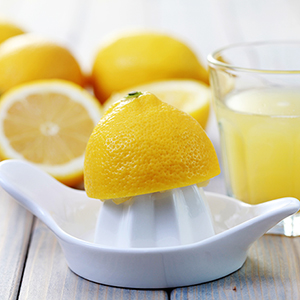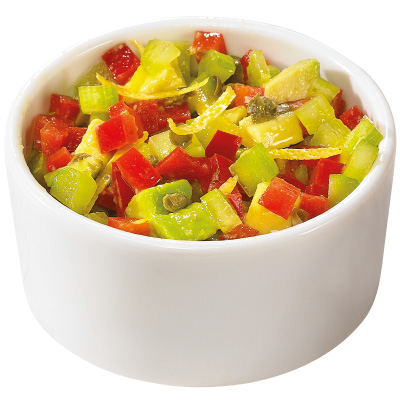- Strawberries
- Cook With Apples
- Grapes
- Grapefruit
- Lemons
- Cabbage
- Asparagus
- All About Bulb Vegetables
- All About Cruciferous Vegetables
- Squash
- All About Root Vegetables
- The Gift of Spice
- Thyme
- Basil
- Raspberries
- All About Tuber Vegetables
- Marjoram / Oregano
- Lemongrass / Citronella
- All Our Fruits, Vegetables and Fresh Herbs
- All About Exotic Fruits
- All About Legumes
- Cooking Pears: Three Inspirational Methods
Lemons
All About Lemons

The lemon has been cultivated in Asia for more than 2,500 years. It was introduced in Spain during the 11th century, and it first appeared on this side of the Atlantic Ocean in the 15th century.
How to make homemade lemonade
Getting the most out of lemons
Did you know that even when your lemon is out of juice, it's still useful? Just freeze it to preserve the peel. Then, whenever you need fresh lemon zest, you're good to go!
Cooking method:
In a colander, rinse the basmati rice until the water runs clear. Use 1½ cups (375 ml) water for every 1 cup (250 ml) of rice. In a saucepan, combine water, rice and a pinch of salt. Bring to a boil, then cover and simmer at low heat for 10 to 15 minutes. The secret to making perfect rice? Add a little less water than suggested on the package. You can always add more later, but there's no cure for mushy rice if you add too much. While cooking, taste your rice, and add more water if it's not tender enough, then cover and cook a little longer. Don't forget that rice also gets softer while it's resting after cooking.
Characteristics
Lemons’ size and sourness vary according to the variety. Today, the lemons found in stores are picked green and are then ripened artificially in warehouses. If they were picked at maturity, lemons would be too sweet and they would lose their acidity.

Tips and advice
- Choose a lemon that is firm and heavy for its size. The skin should be finely grained and a beautiful, bright yellow in colour.
- Traces of green on a lemon indicate a higher level of acidity.
- To squeeze more juice from your lemon, warm it by rolling it between your hands, briefly cover it with boiling water or place it in the microwave for 30 seconds.
- Use the lemon to make refreshing lemonade or flavoured tea.
- Grate, cut or candy lemon peel to add flavour to desserts, drinks and other dishes.
- When making vinaigrette, replace white vinegar with lemon juice for a light, refreshing spin.
- To freeze the juice of a lemon, pour the juice in an ice cube tray and place it in the freezer. Once solid, transfer the cubes into a freezer bag. Each cube is equivalent to the juice of approximately one lemon.
Expert tip
To cook fish without using heat, marinate the fish for an extended period in lemon or lime juice like you would a ceviche.
Nutritional value
Ounce for ounce, the lemon is as rich in vitamin C as the orange.
Storage
Lemons can be kept at room temperature for about one week. To extend their storage life, wrap lemons in a paper towel and place in a plastic bag. A lemon can last up to three months stored in the dark environment of your refrigerator’s fruit drawer.


















